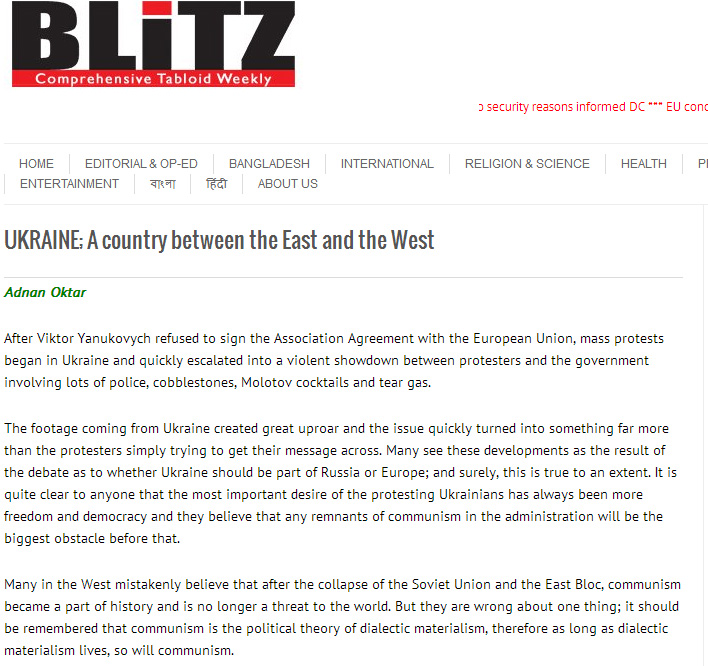
After Viktor Yanukovych refused to sign the Association Agreement with the European Union, mass protests began in Ukraine and quickly escalated into a violent showdown between protesters and the government involving lots of police, cobblestones, Molotov cocktails and tear gas.
The footage coming from Ukraine created great uproar and the issue quickly turned into something far more than the protesters simply trying to get their message across. Many see these developments as the result of the debate as to whether Ukraine should be part of Russia or Europe; and surely, this is true to an extent. It is quite clear to anyone that the most important desire of the protesting Ukrainians has always been more freedom and democracy and they believe that any remnants of communism in the administration will be the biggest obstacle before that.
Many in the West mistakenly believe that after the collapse of the Soviet Union and the East Bloc, communism became a part of history and is no longer a threat to the world. But they are wrong about one thing; it should be remembered that communism is the political theory of dialectic materialism, therefore as long as dialectic materialism lives, so will communism.
There are many people in the Ukrainian administration that have been subjected to a communist education and therefore still believe in the so-called merits of dialectic materialism. Although the state is not officially communist, the ideology still lives on in various parts of the administration. This inevitably causes the reactions of the administration to be similar to communist methods seen during the communist era.
What happened to Ukrainian opposition activist Dmitro Bulatov or the things Iryna Krashkova went through in the village of Vradiyika are unlikely to be seen in any Western type democracies. 1,922 files that the European Human Rights Court is now seeing with respect to Ukraine’s alleged human rights violations testify to the fact that the country has a long way to go in terms of achieving high levels of human rights and freedom.
A report recently published by the Transparency International points to another problem Ukraine faces: Ukraine comes in 144th out of 177 countries in terms of transparency. It also lists Ukraine as the most corrupt nation in Europe1 and the Transparency International report indicates that the situation is worsening every year in Ukraine. Surely, a more transparent government and the passage of stringent anti-corruption laws, along with an improved democracy will help alleviate all these problems in Ukraine.
Another aspect of the Ukraine unrest is Russia. There are many reasons why Russia is so closely interested in Ukraine and first and foremost is its Black Sea Fleet based in the Crimean Peninsula. The future of the Russian Naval Facility in Tartus, Syria is nebulous due to the civil war in Syria and this makes the Black Sea Fleet the only option it enjoys for a warm-water port. It is true that with a deal signed in 2010, the parties agreed to keep it until 2042, but Russia still seems to be deeply uneasy about its future prospects, especially in the case of a pro-EU administration in office in Ukraine.
During the communist era, the Soviet Union used the Communist East European countries as a buffer zone between itself and the Western world. With the collapse of the Eastern Bloc, all those countries joined the other side and that left Russia with Ukraine as its only buffer zone, as Russia wanted to continue with its ‘border security’ defense strategy. At the moment, it seems to now be losing Ukraine as well. If Russia loses its grip in Ukraine, many other countries may follow suit such as Georgia, Armenia, and Kazakhstan. Even the thought of such a possibility is enough to put Russia on edge.
But does Ukraine have to be pro-Russia, anti-Europe or pro-Europe? Can’t there be a third option that will bring some peace and safety to the country?
Although the developments in Ukraine must be cautiously observed, they can also present new opportunities and possibilities. A new approach can be introduced that will effectively end the old bipolar worldview, all thanks to Ukraine.
To do that, Ukraine should continue its friendly ties with Russia, but also sign the Association Agreement with the EU in order to develop closer relations with Europe. However, before that, the Kiev administration must reassure Moscow that it will maintain its friendly ties with the CIS countries and that no existing treaties will be impaired. Ukraine can adapt itself to the legal, social and political criteria required by the European Union without distancing itself from Moscow; it is a matter of finding balance in the pursuit of its foreign policy.
This is surely possible with the alliance of good and reasonable people in the world. If Ukraine succeeds in that, it will open the doors to an unparalleled opportunity; going down in history as the country that brought an end to East-West polarization and introduced East-West alliance instead.
Adnan Oktar's piece on Blitz:


